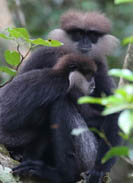Get
To Know
|
 The Purple - Faced Langur is an Old World monkey endemic
to Sri Lanka. They are long-tailed, arboreal, mostly brown species
with a dark face and a very shy nature. They live in closed canopy
forests in Sri Lanka's mountains and the southwestern part of the
country, known as the "wet zone". They are mostly folivorous, but
will also feed on fruits like Dimocarpus longan and Drypetes sepiaria,
flowers, and seeds. While they normally avoid human habitations,
fruit such as jak, rambutan, banana, and mango may contribute up
to 50% to their diet in cultivated areas. Their digestive tract,
with its specialized stomach bacteria, has evolved to derive the
majority of their required nutrients and energy from complex carbohydrates
found in leaves. Males are usually larger than females and both
have black to grayish brown coats, and whitish to gray short 'trousers'
rounded off by purplish-black faces with white sideburns. Part of
the back is covered with whitish fur, and tail is also furred with
black and white mixed colors. Feet, and hands are also purplish-black
in color. They use vocalization to alert members of predators, attract
mates, defend territory, and locate group members. Like humans,
adult males are the most vocal among the entire group and their
defensive whooping calls are also accompanied by intense visual
and locomotive displays. Their range has constricted greatly in
the face of human encroachment, although it can still be seen in
Sinharaja, Kitulgala, Kandalama, Mihintale, in the mountains at
Horton Plains National Park or in the rainforest city of Galle.
Populations are critically low within and between sites. Threats
to this species include infringement on range by croplands, grazing,
changing agriculture, road production, soil loss/erosion and deforestation,
poisoning from prevention of crop raiding, and hunting for medicine
and food.
The Purple - Faced Langur is an Old World monkey endemic
to Sri Lanka. They are long-tailed, arboreal, mostly brown species
with a dark face and a very shy nature. They live in closed canopy
forests in Sri Lanka's mountains and the southwestern part of the
country, known as the "wet zone". They are mostly folivorous, but
will also feed on fruits like Dimocarpus longan and Drypetes sepiaria,
flowers, and seeds. While they normally avoid human habitations,
fruit such as jak, rambutan, banana, and mango may contribute up
to 50% to their diet in cultivated areas. Their digestive tract,
with its specialized stomach bacteria, has evolved to derive the
majority of their required nutrients and energy from complex carbohydrates
found in leaves. Males are usually larger than females and both
have black to grayish brown coats, and whitish to gray short 'trousers'
rounded off by purplish-black faces with white sideburns. Part of
the back is covered with whitish fur, and tail is also furred with
black and white mixed colors. Feet, and hands are also purplish-black
in color. They use vocalization to alert members of predators, attract
mates, defend territory, and locate group members. Like humans,
adult males are the most vocal among the entire group and their
defensive whooping calls are also accompanied by intense visual
and locomotive displays. Their range has constricted greatly in
the face of human encroachment, although it can still be seen in
Sinharaja, Kitulgala, Kandalama, Mihintale, in the mountains at
Horton Plains National Park or in the rainforest city of Galle.
Populations are critically low within and between sites. Threats
to this species include infringement on range by croplands, grazing,
changing agriculture, road production, soil loss/erosion and deforestation,
poisoning from prevention of crop raiding, and hunting for medicine
and food.
|
|
|
|
Horses
by
John Grey
At the track,
I bet on thoroughbreds
that pounded their fetlocks
into clods of mud
in a bid to make my ticket pay.
By the paddock gate,
I watched Morgans
graze and gambol,
rub against fence-posts,
work within these limits
man draws up for them.
I've been exhilarated
by the sight of herds
on the rocky plains,
oblivious to stop-watches,
unrestrained by fences,
going where the dust clouds
at their hooves take them.
I've ridden horses
but mostly on slow trails,
following a leader.
Those beasts obeyed
the slightest nudge of rein,
even an encouraging whisper.
And my wife and I once
cuddled together in a carriage
on a cold November evening,
trotted through Central Park
behind a laconic roan mare.
Horses are good at
giving the impression
that what they do
is for my benefit.
I'm at a parade.
And here come the Clydesdales.
It's the highlight of my day
so what choice do they have?
John Grey is an Australian poet, US resident. Recently published in
Schuylkill Valley Journal, Stillwater Review and Big Muddy
Review with work upcoming in Louisiana Review, Columbia Review
and Spoon River Poetry Review.
|
 Purple-Faced
Langur - Issue Thirty
Purple-Faced
Langur - Issue Thirty